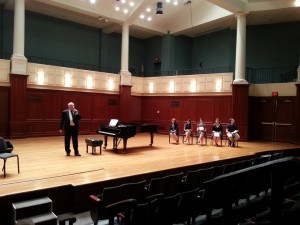By Samantha Serra
Staff Writer
An elegant Steinway and Sons grand piano sat in the center of a polished, hardwood floor as the performance began. The four students each took turns showing off their unique and beautiful operatic voices for the quiet crowd. The dome-shaped room was filled with voices ranging from soprano to tenor, displaying not only the talent of each performer, but also how the composition of opera has evolved.

Opera is an art form that has been crafted by talented composers and musicians over thousands of years. It is popular for its use of beautiful voices of all ranges accompanied by the harmonic blend of orchestral instruments to tell stories.
From Claudio Monteverdi to Giuseppe Verdi, opera has developed into more than just narration with actors.
“To me, it is some of the most beautiful pure music that has ever been created,” said Jerry Kalstein, president of Boheme Opera NJ.
Kalstein hosted the Evolution of Opera event on Friday, April 11, in Mayo Concert Hall, where he not only spoke about the transformation of opera and played example pieces, but also shared the stage with his co-founder and managing director, Sandra Pucciatti, and four of the College’s talented School of Arts students, who each performed an operatic piece for the crowd along with Pucciatti on the piano.
“I have worked with two of them already and they are wonderful,” Pucciatti said.
Two of the students, junior music education major Diana Befi and senior music major Raquel Nobile, have worked with Boheme Opera and Pucciatti before with much pleasure.
“We did this a few semesters ago and I actually played her,” Befi said, regarding the her character she performed as during the event.
Befi’s piece was used to portray the early development of opera as a form of depicting emotion through song, which she did perfectly, draping her right arm across the piano as she emoted anguish and despair even those not fluent in the foreign language could comprehend.
“Looking at the audience and seeing their reactions makes it all worth it,” said Nobile, who has also worked with Boheme Opera.
Nobile’s soprano range was used near the end of the event to portray how, through the developments of Wolfgang Amadeus Mozart and Giacomo Puccini, opera had become more realistic and dramatic in its storytelling.
“Puccini brought to the table passion and emotion,” Kalstein said.
Beginning 45 years ago when he met Edward Bogusz, an acclaimed bass-baritone, Kalstein has been working in the production and narration of opera. He is a strong advocate of giving students interested in pursuing careers in the field hands-on experience and chances to perform for audiences.
“We would love to have them attend the dress rehearsals and do more programs like this,” Pucciatti said.






